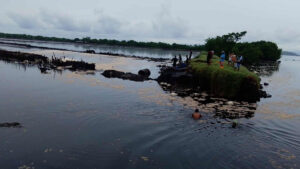By Diego Morra
It is strange why the Department of Environment and Natural Resources (DENR) needed to be goaded by Malacanang to investigate the spill of a wastewater pond of a distillery of the Universal Robina Corp. (URC) in Bais City, Negros Oriental last month and prepare criminal charges against those responsible for the co9llapse of the pond.
DENR could, motu proprio, initiate legal proceedings against URC, a company owned by the Gokongwei family, just as it should have investigated the toxic fumes emanating from another Gokongewei company in Batangas City many years ago. The naphtha cracker plant in Barangay Simlong was the subject of numerous complaints by residents, who alleged that the factory emitted toxic fumes. The company eventually racked up more than P11-billion in losses as its naphtha cracker technology was rendered obsolete by ethane cracker technology. President Ferdinand Marcos Jr.’s key economic adviser Frederick Go is a member of the Gokongwei family.
The Pambansang Lakas ng Kilusang Mamamalakaya ng Pilipinas-Negros Island (Pamalakaya-Negros Island) and the environmental group Hakson Inc. urged the DENT to throw the books at URC for the spill on North Bais Bay that started on Oct. 24 and damaged 3,000 hectares of the Tañon Strait Protected Seascape (TSPS), a key marine biodiversity area in the country and host to 14 species of cetaceans. The Gokongwei company blamed the collapse on earthquakes and heavy rains but Hakson Inc. rejected URC’s excuse, noting that natural disasters are not responsible for decades of substandard and unsafe waste and pollution management.
Following the Palace order, Vicente Losbanes, director of the Environmental Management Bureau (EMB) in the Negros Island Region (NIR), said “our legal team now is preparing two sets of charges against URC Bais Distillery for violation of the Clean Water Act of 2004 and Expanded National Integrated Protected Areas System Act.” He admitted the pollution caused by the spill was “serious” and affected the environment and livelihoods of people Bais City and Manjuyod town in Negros Oriental.
The DENR move came after the environmental watchdog Greenpeace expressed serious concern about the ethanol spill and urged an immediate cleanup, suspension of distillery operations until environmental and livelihood impacts are assessed, compensation for affected communities, enforcement of penalties on URC, and stronger safeguards for fisheries and coastal ecosystems. Greenpeace also urged lawmakers to fast-track the approval of the proposed Climate Accountability Act, which would institutionalize measures for accountability and similar legislation to hold corporations and government accountable for environmental and climate damage.
Losbañes claimed that as of Nov. 5, the repair of the damaged tailings pond was 70% complete. He said that since Typhoon Tino spared spared Bais City, the spill was mitigated. URC has deployed workers to repair the damaged walls of the 20-hectare pond and vowed to build an additional reinforcement wall designed to withstand unusually strong rain, tides and earthquakes. The company expects the work to be completed by Nov. 14. URC said it is also assisting families affected by the release of organic molasses-based wastewater. Recent seawater quality monitoring, conducted with the Philippine Coast Guard, DENR-TSPS, and Silliman University, shows improvement in dissolved oxygen and water color in affected areas.
“Thousands of fisherfolk will surely take long to recover their livelihood…so local authorities and relevant government agencies must take swift action to help those who cannot go out to fish,” Pamalakaya-Negros Island chairperson Vincent Fernandez said. Tañon Strait’s rich waters harbor the endangered Irrawaddy dolphin, as well as turtles, whale sharks and a variety of coral and seagrass species. Hakson Inc. and Pamalakaya-Negros Island have demanded that URC pay for Bais Bay’s full rehabilitation and compensate fisherfolk for their lost income.
The spill, Pamalakaya and Hakson argued, is the “predictable outcome of a development model that prioritizes ethanol export and private gain over ecological safety,” Pamalakaya added that the disaster was the result of the company’s negligence and disrespect for the environment and the people. The spill stole the livelihoods of more than 3,000 fisherfolk in Bais City and Manjuyod town. This prompted the fisherfolk to seek financial assistance from the local government and long-term compensation from URC, which was responsible for the spill in the first place. In response, URC said: “We continue to collaborate closely with the DENR as well as other experts to study all options for the rehabilitation of the marine area.”




